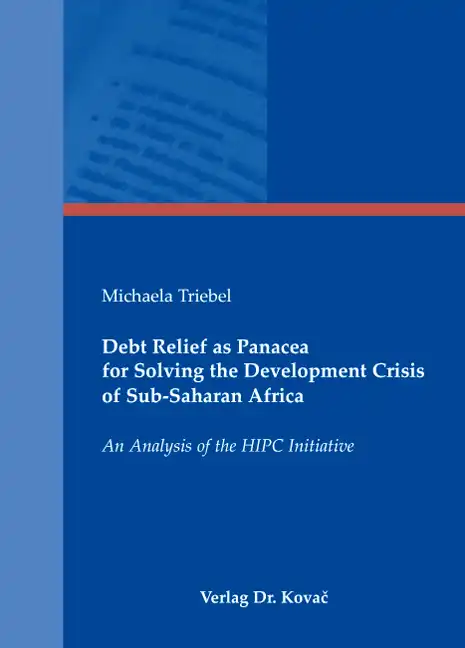Michaela TriebelDebt Relief as Panacea for Solving the Development Crisis of Sub-Saharan Africa
An Analysis of the HIPC Initiative
Wirtschaftspolitik in Forschung und Praxis, Band 40
Hamburg 2008, 314 Seiten
ISBN 978-3-8300-3909-9 (Print)
ISBN 978-3-339-03909-5 (eBook)
Zum Inhalt
During the last years, poverty reduction has been in the centre of attention of all development agencies. While Latin America and East Asia as a region managed to significantly improve the living conditions of their people, the quality of life for most people in sub-Saharan Africa appears to only have improved marginally. Africa remains the least developed region of the world. Therefore, the development problem of the African continent has been subject to great concerns for decades over decades. Still, despite great efforts to solve the development crisis of sub-Saharan Africa sustainable development does not seem to gain ground.
Today, debt relief measures, such as the Heavily Indebted Poor Countries (HIPC) Initiative or the Multilateral Debt Relief Initiative (MDRI), have moved into the focus of development cooperation. In fact, debt relief is considered as the panacea for solving the crisis. Yet, as long as the general environment, i.e. the institutional setting in the sub-Saharan African countries remains unfavourable to growth and development also debt relief will not lead to the hoped-for effects. Nevertheless, the HIPC Initiative with the conditions of showing a good track record with the IMF and of preparing a poverty reduction strategy paper (PRSP) with the broad-based participation of civil society might have the potential to change the prevailing institutional quality. This potential of the HIPC Initiative to result in institutional change is the subject of this study. Thereby the main focus is put on the PRSP approach in eight case study countries, namely Burkina Faso, Ghana, Malawi, Mali, Mozambique, Rwanda, Tanzania and Uganda.
